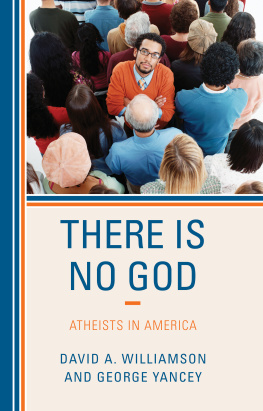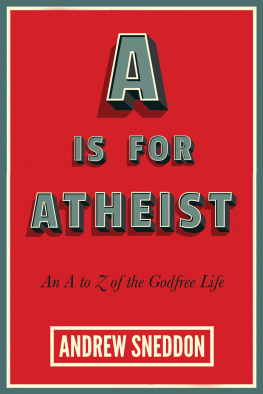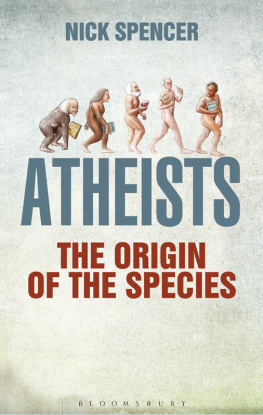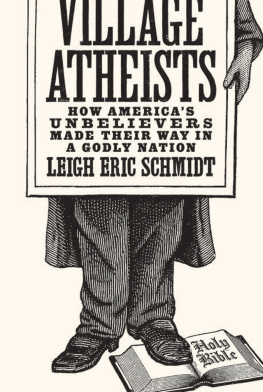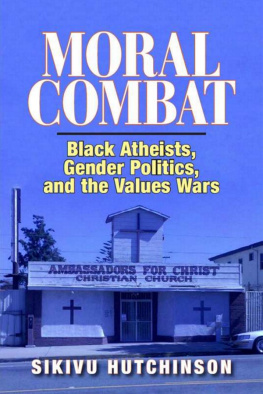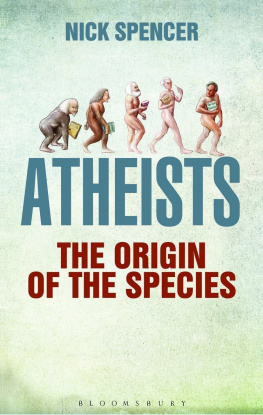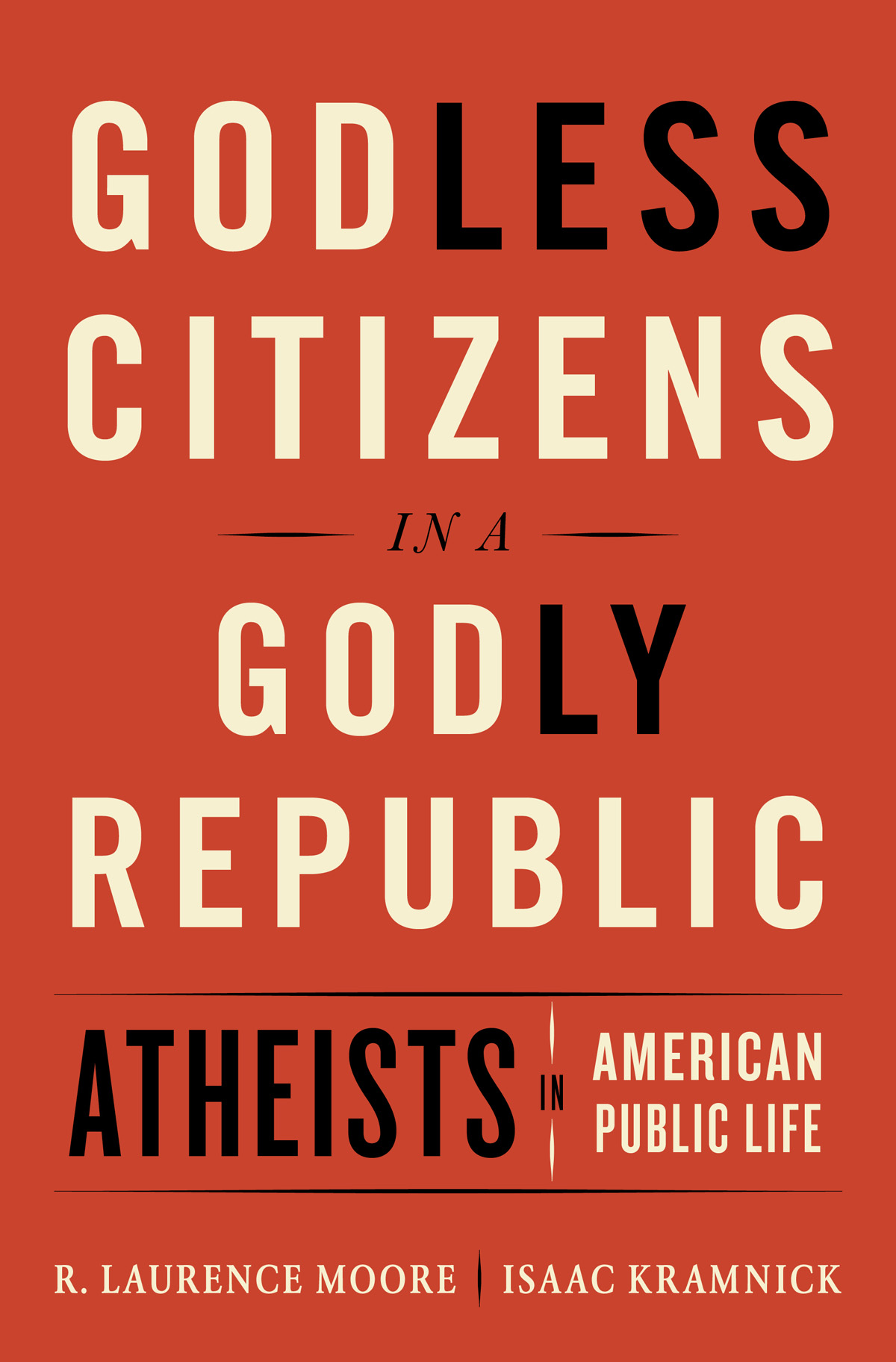Contents
Guide
Page List
GODLESS CITIZENS IN A GODLY REPUBLIC

Atheists in American Public Life
R. LAURENCE MOORE
AND
ISAAC KRAMNICK

W. W. NORTON & COMPANY
Independent Publishers Since 1923
NEW YORK LONDON
To our grandchildren, who, we hope, may freely choose to believe in one God, twenty Gods, or no God.
The matter of faith has been in the papers again lately. President Eisenhower... has come out for prayer and has emphasized that more Americans are motivated (as they surely are) by religious faith. The Herald Tribune headed the story President says prayer is part of democracy. The implication in such a pronouncement, emanating from the seat of government, is that religious faith is a condition, or even a precondition of democratic life. This is just wrong. A President should pray whenever and wherever he feels like it... but I dont think a President should advertise prayer. That is a different thing. Democracy, if I understand it at all, is a society in which the unbeliever feels undisturbed and at home. If there were only a half a dozen unbelievers in America, their well-being would be a test of our democracy, the tranquility would be its proof.... I hope that Belief never is made to appear mandatory.... I hope my country will never become an uncomfortable place for the unbeliever, as it could easily become if prayer was made one of the requirements of the accredited citizen.
E. B. White, 1956, author of Charlottes Web and Stuart Little, Cornell University, class of 1921
CONTENTS
To keep our book as accessible as possible, we have dispensed with footnotes. Many of the primary sources we have used have been published in multiple editions and can easily be accessed online. To cite a page number in a specific edition of Jeffersons Notes on the States of Virginia is superfluous and in fact not very helpful. Its far simpler for our readers to Google important quotations. Dates and page numbers from secondary sources and from some primary material, including newspaper articles, are contained in chapter notes at the end of the book. Also in those chapter notes are short lists of books we have not cited that may interest readers.
To the ears of many Americans, the word atheist has a hard, unpleasant ring to it. Describing oneself with that label has never been a recommended way to court popularity. For that reason, many nontheists prefer to describe their beliefs with a different term. They call themselves agnostics, or freethinkers, or humanists, or secularists, or simply nonbelievers. Statisticians have invented the term nones, referring to the answer given by many people when asked for a religious preference.
These less confrontational-sounding words connote a variety of meanings, but people who embrace them share a deep skepticism toward the doctrines of Christianity, which has been the religious persuasion of most Americans over the course of the nations history, despite the fact that at the beginning of our national experiment most of the ex-British colonials who had just forged a union didnt regularly attend church. Many of the prominent white men who wrote the nations fundamental documents called themselves deists. They believed in a designer Creator, but in none of the core beliefs of Christianity. The virgin birth, the miracles attributed to Jesus, his resurrection and saving grace, heaven and hellall of these ideas, they thought, flew in the face of reason. So did the belief that the Bible was the revealed word of God. For deists, reason always trumped faith. Deists saw their belief system as irenic. It eschewed the theological squabbles that had caused too many bloody wars in Europe.
Thomas Jefferson believed in progress. For him the peaceful intention of deism marked an important human advance in his revolutionary generation. He saw it, or perhaps Unitarianism, becoming the settled religious view of the American nation. Unitarians remained committed to Christianity even though they professed a skeptical attitude toward many of its central doctrines, including the divinity of Christ and the reality of biblically recorded miracles. Thomas Jeffersons view on this point proved to be as mistaken as his notion that American slavery would die a natural death. Deism faded away. Americans turned their energies to building and populating churches. In the early nineteenth century, a new generation of American leaders branded nonbelief in a God who intervened in human affairs and who judged humans as fit or unfit for heaven as a scandalous position bordering on moral turpitude. However illogically, they equated deism with atheism. Atheism became a pejorative, a blanket term that covered all forms of religious skepticism. Ministers and politicians used it to attack threats, often more imagined than real, on social order and the rule of law. Individual states had laws that placed a premium on traditional theistic beliefs.
Those laws in part reflected the nervousness attendant to our democratic experiment. We easily forget that our early history was not a period marked by strong national self-confidence or greatness. If it seemed plausible that atheism undermined social stability, that fact justified laws that discriminated against nonbelievers. It didnt strike most early Americans as controversial that people who denied the existence of a divine creator could not hold public office. In many states they could not testify in court, even in their own defense. If they published treatises proclaiming their nonbelief or spoke about it publicly, they could face criminal charges that subjected them to heavy fines or jail terms.
A different point of view remained embedded in the United States Constitution. Its First Amendment, along with a provision in Article 6 banning religious tests for federal offices, suggested that Americans shouldnt face discrimination because of what they believed or didnt believe about God and religion. But until 1940, when the Supreme Court in Cantwell v. Connecticut held that the concept of due process of law embodied in the Fourteenth Amendment made the religious clauses of the First Amendment applicable to the states, states could follow their own notions of what constituted religious liberty. They were free to write laws based on the assumption that atheism, deism, or religious skepticism posed a danger to the safety and morals of the community. Denied basic civil rights available to most Christians, and usually to Jews, nonbelievers were relegated to second-class citizenship.
American state laws have changed over the years, and nonbelievers have more legal security in the twenty-first century than they had one hundred years ago. Even so, a belief based on theistic religious teachings may still carry more legal weight than a belief based on a secular philosophy. Moreover, on the playing field of public opinion, the rules for believers and nonbelievers are not equal. Whatever the law says, an avowal of atheism effectively disqualifies a person from the nations highest public offices and many local offices in much of the country. More than half of polled Americans state without equivocation that they would never vote for anyone who doubts the existence of God, whatever his or her qualifications. People who have no use for religion may run for public office, but no political adviser would tell them to declare openly their nonbelief in God.


